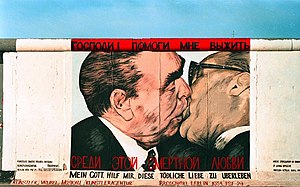社会主义兄弟之吻
社会主义兄弟之吻,又称社会主义兄弟般的拥抱,是一部分马列社会主义国家政治家之间的一种特殊问候方式。该行为据称可以展现马列社会主义国家间存在的“特殊联系”[1]。


“社会主义兄弟之吻”包含有一次拥抱和三次交替亲吻双颊[2]。在非常罕见的情况下,当两位领导人认为双方格外亲近时,双方会直接亲吻对方的嘴而不亲吻脸颊[3]。“社会主义兄弟般的拥抱”则包含连续三个深度拥抱,身体两边左右交替,不涉及亲吻[4]。该问候方式主要为亚洲共产党国家领导人所采用,因为亚洲没有通过亲吻脸颊表示问候的传统。冷战期间,亚洲共产党领导人通常接受来自欧洲和古巴人的亲吻,但自己之间则不进行亲吻。
自从中东欧共产党政权倒台以后,“社会主义兄弟之吻”已经不再流行。不过,“社会主义兄弟般的拥抱”则继续在亚洲共产党领导人间流行。此外,古巴也采用了亚洲模式[5][6]。
历史
编辑该行为源自欧洲,家庭成员或朋友间会以亲吻脸颊的方式表示问候。该行为也与东正教兄弟会或复活节之吻有关[3]。这一行为在东正教教堂的仪式中根深蒂固,表达能力很强,因此在日常生活中得到了应用。
作为平等、博爱和团结的象征,“社会主义兄弟之吻”体现了19世纪中叶至末期新兴工人运动的激情。十月革命后,随着共产国际的建立,这一原本自发的行为逐渐演变成了一种仪式,成为了共产党同志之间正式问候的方式。由于许多共产党员和社会主义者当时前往地处偏远的苏俄,不得不要进行漫长、艰苦而危险的旅行,这种象征着牢固友谊的行为也因此变得更加流行[来源请求]。
随着第二次世界大战后共产主义的扩张,苏联不再是唯一的共产主义国家。“社会主义兄弟之吻”成为共产党国家领导人之间礼节性问候的方式。第三世界的社会主义领导人[7][8],巴勒斯坦解放组织和非洲人国民大会等有社会主义倾向的解放运动的领导人也都开始采用“兄弟之吻”或“兄弟般的拥抱”[9][10]。
苏联问题研究
编辑一些苏联问题研究专家会特别关注共产党领导人之间是否互相拥抱。跳过这一常规会被视作双方关系处于较低水平的象征[11]。
例如,在中苏交恶之后,中国人拒绝拥抱苏联同行,或拒绝称苏联人为“同志”[12]。即使在1989年双方关系正常化后,中国大陆领导人在问候苏联领导人时仍然跳过了“兄弟般的拥抱”。不过,中国大陆领导人在与其他共产党国家的领导人会面时仍会互相拥抱[13]。这样做是为了强调中苏关系没有恢复到中苏分裂前1950年代的水平。中国大陆外交礼节中特别表示与苏联人“只握手,不拥抱”[14][4]。
由于其重要的象征意义,即使存在有严重分歧,共产党领导人通常仍会互相拥抱,以免给公众造成关系紧张的印象。例如,虽然中国大陆和越南对南沙群岛的主权存在异议,但是中国大陆和越南领导人仍会互相拥抱[4]。
亲吻脸颊
编辑“社会主义兄弟之吻”不应与世界领导人之间通常的亲吻脸颊相混淆。例如,法国总统传统上也会通过亲吻双颊来问候世界各国领导人[15][16]。不过,这并不是“社会主义兄弟之吻”,原因是只亲吻两次,而且没有意识形态的含义。戴高乐主义的总统和社会党总统都采用这种做法。
流行文化
编辑“社会主义兄弟之吻”因东德领导人、德国统一社会党总书记埃里希·昂纳克和苏联领导人、苏联共产党总书记列昂尼德·勃列日涅夫二人接吻的照片而知名,此后,它以涂鸦的形式在柏林墙出现,名为《我的上帝,助我在这致命之爱中存活》。
参考
编辑- ^ Photos: A History of Lip-Locking in Russia, Home of the "Socialist Fraternal Kiss". Vocativ. 2013-08-20 [2017-06-04]. (原始内容存档于2017-04-28).
- ^ Smale, Alison. Romania Cool Toward Gorbachev's First Visit. Associated Press. 1987-05-25 [2019-10-21]. (原始内容存档于2018-02-14).
Soviet leader Mikhail Gorbachev and President Nicolae Ceausescu, who has openly attacked recent Kremlin reforms, greeted each other warmly today as Gorbachev began his first visit to this maverick East bloc nation. The two leaders embraced and kissed each other three times on both cheeks.
- ^ 3.0 3.1 Belton, Padraig; Citron, Lana. The Politics of the Kiss. New Statesman. 2016-02-11 [2017-06-04]. (原始内容存档于2017-07-17).
- ^ 4.0 4.1 4.2 Chinese Premier Li Keqiang begins Vietnam visit. Reuters. 2013-10-13 [2019-10-21]. (原始内容存档于2017-04-05) –通过YouTube.
- ^ Chinese President Xi Jinping awarded Cuba's Jose Marti Medal. CCTV.com English. Xinhua. 2014-07-23 [2019-10-21]. (原始内容存档于2017-02-02).
Chinese President Xi Jinping (L) hugs Cuban President Raul Castro after being awarded Cuba's Jose Marti Medal in Havana, capital of Cuba, July 22, 2014. (Xinhua/Ma Zhancheng)
- ^ Castro brothers' China complex. ChinaDaily.com.cn. Sina.com. 2014-07-23 [2019-10-21]. (原始内容存档于2018-02-14).
Fidel Castro and then Chinese Premier Zhu Rongji hug each other on Castro's second visit to China on Feb 27,2003.
- ^ Russian President Podgorny Greeted by President Kaunda. AP Archive. 1977-03-27 [2019-10-23]. (原始内容存档于2017-05-10).
- ^ Venezuelan president Hugo Chavez meets Chinese President Jiang Zemin. AP Archive. 2001-05-24 [2019-10-23]. (原始内容存档于2017-04-04).
- ^ Anderson, Forrest. Yasser Arafat & Deng Xiaoping. Getty Images. 1989-10-05 [2019-10-23]. (原始内容存档于2019-10-23).
Chmn. Deng Xiaoping, (L), embracing PLO Chmn. Yasser Arafat, during mtg. in Beijing, China.
- ^ Nelson, Mike. Muammar Gaddafi. Getty Images. 1990-05-18 [2019-10-23]. (原始内容存档于2019-10-23).
South African anti-apartheid leader and African National Congress (ANC) member Nelson Mandela (l) and Libyan leader Moamer Kadhafi hug each other 18 May 1990 upon Mandela arrival to Tripoli.
- ^ Biers, Dan. Summit Stumper: Will Deng Hug Gorbachev?. Associated Press. 1989-05-15.
Will they or won't they? The big question when the tightly orchestrated Soviet-Chinese summit between Mikhail S. Gorbachev and Deng Xiaoping begins is whether the leaders will embrace to symbolically end 30 years of strained relations.
- ^ Biers, Dan. Summit Stumper: Will Deng Hug Gorbachev?. Associated Press. 1989-05-15.
When Soviet Foreign Minister Eduard Shevardnadze visited Deng in Shanghai last February he received a warm and lengthy handshake, but no hug. Schevardnadze referred to the Chinese leader as "comrade," but the socialist honorific was not returned.
- ^ National Technical Information Service. Daily Report: People's Republic of China. United States Foreign Broadcast Information Service. 1989, (20-29).
But the Chinese leader did not embrace Mr. Shevardnadze, as he usually does with visiting personalities from communist nations.
- ^ Radchenko, Sergey. Unwanted visionaries: the Soviet failure in Asia at the end of the Cold War. New York, NY: Oxford University Press. 2014: 166. ISBN 9780199938773.
The main question of protocol, mulled over by the media, was whether Deng would bear-hug Gorbachev or offer him a handshake. This came under careful scrutiny of policy makers at the highest level. "Embracing might shock the world," Deng said with an eye to the West's reaction. Therefore, the Chinese protocol specifically provided for "handshake, no embrace" to highlight the new character of Sino-Soviet relations.
- ^ YouTube上的Arrivée en France du président Hu Jintao
- ^ Sarkozy and Merkel inject new life into alliance. RFI English. Reuters. 2010-02-04 [2019-10-23]. (原始内容存档于2018-12-14).
French President Nicolas Sarkozy and German Chancellor Angela Merkel kissing at the Elysee Palace in Paris on 4 February
外部链接
编辑- Schimmel, Claudia, Der ‚sozialistische Bruderkuß‘ [The ‚Socialist Fraternal Kiss‘] (PDF, 128 kB), [2019-10-23], (原始内容存档 (PDF)于2020-05-21) (德语)